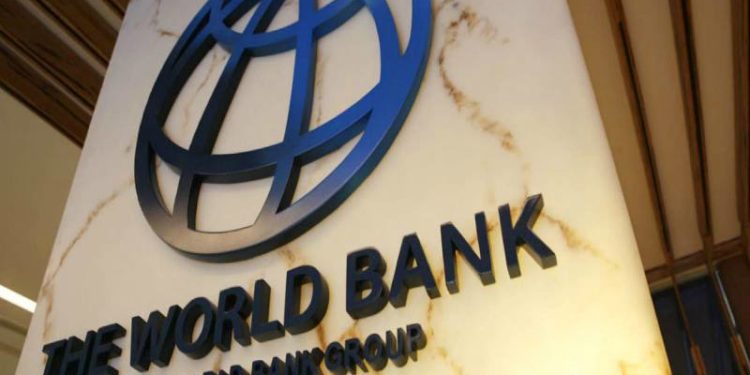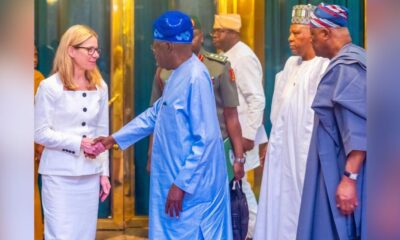Business
FG borrowed N1.3tn to subsidise power, says W’Bank report

A new report of the World Bank has revealed that the Federal Government has borrowed a total of N1.3tn since 2017 to ensure that generation companies and gas suppliers get enough payments to sustain electricity supply.
The bank stated this in its ‘Resilience through Reforms’ report, which also indicated that the nation’s power sector would require additional N3.08tn through 2023 to sustain the current performance levels and tariffs.
The report said, “To ensure that Gencos and gas suppliers receive enough payments to continue generating electricity, since 2017 the FGN has borrowed a total of N1.3tn ($4.2bn).
“In 2019 total FGN support reached N524bn ($1.7bn), 0.4 per cent of GDP – higher than the N428bn budget for health and just 20 per cent less than the N650bn budgeted for education.”
The World Bank noted that although all the six generation companies, and eleven distribution companies had been privatised, the Federal Government through the Nigerian Bulk Electricity Trading Company had continued to buy electricity from the Gencos and independent power producers before reselling to the Discos.
The FG’s agency, Nigeria Electricity Regulatory Commission, regulates tariff in the sector.
The bank stated that the Transmission Company of Nigeria was still strictly government-owned.
Nigerians pay less than the cost of production for electricity, according to the report, resulting in revenue shortfall.
The FG paid N1.68tn as cumulative tariff shortfall between 2015 and 2019, it said.
Due to foreign exchange depreciation and rising domestic inflation, tariff shortfalls had also been on the rise, the bank added.
The report stated, “Every Nigerian who receives electricity from a Disco pays less for electricity than the cost of supplying it.
“However, 80 per cent of the spending on tariff shortfalls benefits the richest 40 per cent of the population; only eight per cent benefits the bottom 40 per cent, and of this, less than two per cent benefits the poorest 20 per cent.
“Significant resources spent on funding tariff shortfalls disproportionately benefit the relatively wealthy who have access to the grid and use more electricity so that ultimately, a big chunk of government support goes to those who do not really need help with paying bills.”
The report showed that 43 per cent of the population, which is about 85 million people, lacked access to grid electricity, making Nigeria the nation with the world’s largest energy access deficit.

Auto
Mikano, Autochek Set to Roll Out Virtual Showroom, Expand Auto Finance

Mikano, Autochek Set to Roll Out Virtual Showroom, Expand Auto Finance
Mikano Motors and Autochek Africa are to launch a virtual showroom and expand digital auto financing options in Nigeria, signalling a fresh shift in how vehicles are bought and financed in the country.
The partnership, set for formal unveiling on February 27, 2026, at Mikano Motors’ Victoria Island showroom in Lagos, will see the creation of a dedicated Mikano Motors Virtual Showroom on Autochek’s marketplace.
Through the platform, customers can browse Mikano’s vehicle lineup — including Changan, Maxus and other brands in its portfolio — compare models, and access tailored financing options without leaving the digital space.
Buyers will also be able to explore structured auto loans, flexible payment plans and receive quicker credit assessments within a single ecosystem.
The move effectively migrates critical stages of the car-buying journey online, reducing the delays traditionally associated with financing approvals and documentation.
Group Executive Director of Mikano, Joelle Haykal, said the initiative aligns with the company’s commitment to enhancing customer experience.
“Our goal is not just to sell vehicles, but to simplify ownership,” she said, noting that integrating financing into the buying process gives customers more flexibility and control.
Autochek, a technology-driven automotive marketplace operating across Africa, leverages data analytics to power credit decisions and financial services designed to lower the barriers to vehicle ownership.
By embedding financing directly into vehicle listings, the platform aims to streamline transactions and improve transparency.
Industry analysts say the collaboration reflects a broader trend of digital transformation sweeping across Nigeria’s automotive sector, as dealers and financiers adapt to evolving consumer expectations.
For Mikano Motors, a subsidiary of Mikano International, the deal expands its market reach through digital channels. For Autochek, it strengthens its presence in Nigeria’s new vehicle segment.
Together, both firms are betting on a hybrid retail model that blends physical showrooms with seamless digital access — redefining the path to car ownership in Nigeria.
Business
CBN Mops Up $190 Million to Slow Rapid Naira Appreciation

CBN Mops Up $190 Million to Slow Rapid Naira Appreciation
The Central Bank of Nigeria (CBN) last week intervened in the foreign exchange (forex) market, buying about $189.8 million to slow the rapid appreciation of the Nigerian naira at the official window. Analysts say the move aims to absorb excess US dollar supply, stabilise the currency, and prevent market disruptions that could affect investors and the broader economy.
The naira had strengthened sharply in recent weeks, closing at around ₦1,346.32/$ in the official market — a week-on-week gain of ₦9.09. The parallel market also recorded gains, with rates improving by ₦60 to about ₦1,340/$. As a result, the FX spread — the difference between official and parallel rates — narrowed significantly to 0.47% from 3.29% the previous week, signalling improved convergence between the markets.
TrustBanc Financial Group noted that the naira’s successive rally could have prompted foreign investors to exit the fixed-income market, selling their holdings to repatriate profits. This scenario could have triggered higher US dollar demand, putting additional pressure on the naira and weakening market stability.
READ ALSO:
- FCT Poll: Falana Queries Wike’s Power to Declare Public Holiday
- Iran Threatens ‘Ferocious’ Retaliation as Trump Weighs Military Action
- Tinubu to Governors: State Police Must Begin Now
Normally, central banks sell dollars to support the currency, but the CBN reversed this trend for the first time in months, buying dollars to moderate gains and prevent speculative surges. Analysts said this measured intervention reflects the bank’s commitment to exchange rate stability and orderly FX market operations.
On the macroeconomic front, Nigeria’s external reserves have remained robust, surpassing $46 billion, supporting the CBN’s ability to manage market dynamics. Strong oil prices, rising reserves, and reform-driven FX inflows have contributed to the naira’s stability, even amid lingering geopolitical risks.
Economists warn that excessive naira appreciation could reduce the competitiveness of Nigerian exports and prompt capital flight, affecting domestic investment. By moderating gains, the CBN seeks to balance currency stability, investor confidence, and the nation’s economic fundamentals.
Investors and businesses are being urged to monitor the FX market closely, as central bank interventions may influence short-term forex availability and pricing. Analysts expect the CBN to continue careful market management while promoting long-term currency stability.
CBN Mops Up $190 Million to Slow Rapid Naira Appreciation
Business
Dangote Opens Refinery Investment to Nigerians With Public Share Sale Plans

Dangote Opens Refinery Investment to Nigerians With Public Share Sale Plans
Aliko Dangote, President of the Dangote Group, has announced that ordinary Nigerians will soon be able to buy shares in the $20 billion Dangote Petroleum Refinery, a move aimed at expanding public participation in one of Africa’s largest industrial projects. The announcement was made during a guided inspection of the refinery by NNPC Limited management, led by Group CEO Bayo Ojulari, and senior officials of the company.
Dangote stated that arrangements are being finalised to allow individual investors to acquire shares within the next four to five months, giving Nigerians direct ownership in the refinery. “Individually, Nigerians too will have an opportunity… in the next maximum four or five months, they will actually be able to buy their shares,” he said.
The Nigerian National Petroleum Company (NNPC) currently holds a 7.25 % stake in the refinery on behalf of Nigerians, ensuring that public interest remains a key aspect of the project. Dangote further explained that investors will have flexibility in receiving returns, saying, “People will have a choice either to get their dividends in naira or to get their dividends in dollars because we earn dollars.”
READ ALSO:
- SERAP Urges Tinubu to Repeal ‘Unlawful’ Mass Surveillance Regulations
- Trump Imposes 15% Global Tariff Hours After Supreme Court Blocks Previous Tariffs
- APC Wins Rivers Ahoada East State Constituency II Bye‑Election
Beyond the public share offering, Dangote highlighted ongoing collaboration with NNPC to enhance operations and explore opportunities across the oil and gas value chain, including potential upstream partnerships. “Most likely… we will partner with them, maybe in some of the upstream. They, too, will partner with us here because here is not a refinery. It’s an industrial hub,” he said.
The refinery is also set to support additional industrial ventures, including the production of linear alkylbenzene (LAB), a key raw material for detergents. Dangote noted that production will be sufficient to meet demand across the African continent within 30 months, underscoring the facility’s industrial significance.
Industry analysts expect the refinery to list on the Nigerian Exchange (NGX) through a phased public offering of 5–10 % equity, similar to earlier listings of Dangote Cement and Dangote Sugar. The move is aimed at enhancing market liquidity, transparency, and public participation, while retaining majority ownership by the Dangote Group.
The public share offering represents a milestone in Nigeria’s industrial and energy sector, offering citizens an opportunity to participate in a globally competitive infrastructure project while benefiting from dividends in local and foreign currency.
Dangote Opens Refinery Investment to Nigerians With Public Share Sale Plans
-

 Business2 days ago
Business2 days agoDangote Opens Refinery Investment to Nigerians With Public Share Sale Plans
-

 Education3 days ago
Education3 days agoUTME: JAMB Clarifies Position on Hijab During Biometric Capture
-

 Politics2 days ago
Politics2 days agoTinubu Hails Wike as APC Dominates 2026 FCT Area Council Elections
-

 Entertainment2 days ago
Entertainment2 days agoRegina Daniels Takes Delivery of ₦150m 2026 GAC Trumpchi M8 SUV
-

 Politics3 days ago
Politics3 days agoADC Defeats APC to Win First Polling Unit in FCT Area Council Election
-

 Politics2 days ago
Politics2 days agoFCT Council polls: APC Wins Four Chairmanship Seats as PDP Takes Gwagwalada
-

 News2 days ago
News2 days agoYoruba Muslim Group Dismisses Viral Ramadan Date Claim, Reaffirms Sultan of Sokoto’s Authority
-

 Politics2 days ago
Politics2 days agoOpposition Weakens as Another Governor Eyes APC Move















